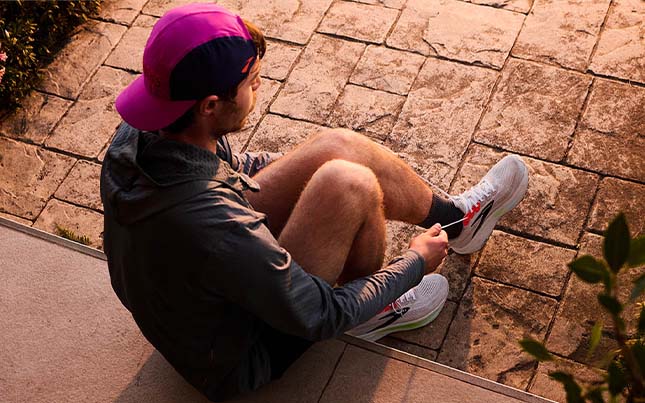Marathon preparation and race day tips no one tells you

Whether you’ve signed up to do a full or half marathon, preparation is key. There’s a lot of information out there and it can be confusing to know where to begin, especially if you’re a first timer on the tracks. That’s why we’ve put together this handy guide to help you prepare for race day at every stage, so you can make strides and run like a pro.
One month before
As a general rule of thumb, it’s said that training and preparation for a marathon should begin 16 to 20 weeks before the big day. Beginners are likely to need longer still, and even experienced runners need to factor in enough time to prepare their bodies for the physical demands of long-distance running.
In the month before your marathon, you should prioritize your overall health and wellbeing. Try to get the sleep and nutrients you need and avoid drinking too much coffee and alcohol during this time.
"The last few weeks before your marathon aren’t about doing more, they are about letting your body cash in on all the hard work you’ve already done. This is when the magic happens: your muscles recover, your energy levels bounce back, and your body gets stronger by doing… less. It might feel counterintuitive, but skipping rest now is like cramming for an exam the night before, it just doesn’t work. Prioritize sleep, eat healthy foods, and trust the process. Respect the taper period, and you will show up feeling fresh, confident, and ready to enjoy every step of race day, maybe even with a smile on your face", says Tim van Beelen, Merchandising Specialist EMEA.
Aside from this, there are a few other things you’ll need to think about one month before race day:
1: Complete your longest run
Your longest run should happen 3-5 weeks before your marathon. The distance will vary depending on your experience level and whether you’re running a full or half marathon. Generally speaking, the longest run for a full marathon should be between 18 and 22 miles; for a half marathon, the longest run is usually between 10 and 12 miles, though more experienced runners might aim for up to 15 miles. The important thing is that you don’t overdo it or do too many longer runs in the weeks leading up to your marathon. You’ll run the risk of turning up on race day feeling fatigued, which will only hinder your performance.

2: Start tapering your training
Begin your marathon taper 2-3 weeks before race day, after your longest run. Tapering gradually reduces the volume and intensity of your training ahead of the marathon, giving your body the recovery time it needs to excel on the day of the race. Proper taper training requires discipline, and it can be difficult to get this right. Reduce your weekly mileage incrementally, decreasing it by about 20-30% per week.
If you do strength training, you should aim to decrease the intensity of this, too, with fewer reps and lighter (or no) weights. To ensure you’re not sore or tired, stop doing any strength training 10 days before the run.
3: Road test your gear
It’s important that you try out your race day gear during training to ensure that it’s comfortable and fits you well. You don’t want any nasty surprises on the day itself, so make sure your shoes, clothes and any layers you want to wear are worn in ahead of time. Also be sure to set up any new devices, such as running headphones or watches.
One week before
The countdown has begun: you have just seven days left until race day. In the final week before a marathon or half marathon, prepare by keeping checks on your health and fitness. Avoid putting your body through any additional stress by skipping the gym and getting plenty of sleep (aim for 8 hours a night). You’ll also want to make sure you’re hydrated for the race, so drink the recommended 1.5-2 litres of water a day. On top of this, there are a few extra preparatory measures you can take:
1: Do pre-marathon carb loading
Carb loading is common practice before a marathon, and it determines what you should be eating the week before. It’s when you consume more carbohydrates than usual ahead of an endurance event, including marathons. The most up to date research recommends carb loading 24-48 hours pre-race and aiming to consume 8-12 grams of carbohydrates per kilogram of your body weight in the 24 hours prior.
The goal isn’t to add more calories to your diet; it’s about prioritising carbohydrates and reducing your fat and protein intake over this period.
When you’re carb loading, choose foods that are easily digestible and don’t have too much fibre, such as:
- White rice
- Pasta
- White, skinless potatoes
- White bread
- Bananas
- Low fibre cereals
You can have a variety of foods during the loading phase. Just don’t eat anything that’s likely to upset your stomach, including new or unusual foods.

2: Check your route and kit
In the week before race day, you should double check the route and make sure you have everything you need for your kit bag. It’s helpful to have a clear strategy for the day, and finalise how you’ll get there and when. Familiarise yourself with the course map and, crucially, find out where the portable toilets are located so you can factor in bathroom breaks. You should also think about your fuelling and hydration plan and have a pacing strategy in place by this time.
3: Beware the Maranoia!
With a week to go, you should have dropped the volume and intensity of your training to less than 50%. Tapering one week before a marathon or half marathon might sound simple, but “taper tantrums” and “maranoia” (yes, these are real things!) can leave runners feeling a little on edge. Some runner's experience irritability during taper training (hence, “taper tantrums”) or worry that they haven’t done enough training; their legs might feel heavy and lifeless, or they may get aches and pains that have seemingly come out of nowhere. This is maranoia and, don’t worry, it’s perfectly normal. Trust the process and focus on getting the rest you need for the week ahead. If you feel as though you need to speak to a professional, then reach out. But know it’s a common phenomenon shared by runners of every level.
Kareem Kaddouri, Marketing Manager Benelux says, "I really struggled with going from working really hard to almost not working at all, it felt counter intuitive. What worked for me is to think of it as a chance for the batteries to charge in the final days. Short runs during the taper help keep some tension in the legs which is good!"
The night before
The night before a marathon, you should focus on hydrating and fueling your body, resting and getting your kit ready for the next day. Eat a carb-heavy meal that’s easy to digest, avoiding spicy foods or anything else that could cause an upset stomach. It’s also best to avoid drinking lots of water in one go; instead, sip water throughout the day to ensure you’re properly hydrated. Ideally, you’ll get a good night’s sleep and feel refreshed the morning of your marathon. Stick to your usual bedtime routine and aim to get 7-9 hours’ sleep, but don’t worry too much if you don’t. It’s well-known that those pre-marathon jitters can affect runners’ sleep the night before, and a restless night doesn’t necessarily mean you’ll race poorly. If you’re struggling to sleep, help your body to recharge anyway by closing your eyes and being still.
Doing a shakeout run a day or two before the marathon should help you to expel any nervous energy you have about the race, which may help you to unwind properly the night before. This is an easy, short jog (no more than 30 minutes long) that’s designed to shake out runners’ nerves and anxiety ahead of race day.

Packing your kit bag
The last thing you want to be doing the morning of your race is scrambling around to find the things you need, so it’s a good idea to get everything together and lay it out the night before. That includes your race day running shoes and clothes, bib, accessories, gels and spare clothes. If it helps, make a list of essential items you’ll need for your marathon and check them off as you go. Some extra things to consider include:
- Sunscreen
- Anti-chafing balm
- Sunglasses
- A sun hat or visor
- Sweatband
- A smartwatch to track your pacing, distance and heart rate
It’s important to check the instructions that have been given about kit bags before turning up on the day. Some marathons offer more flexibility with regards to what you can take, while others might have restrictions that you’ll need to be aware of. In some cases, you’ll be required to use the bag you’re given.
Race day tips
The day of the marathon has arrived, and you’re probably bubbling away with excitement after all those weeks of training. To make sure race day runs smoothly (pun intended), follow these last-minute tips.
What to do on the morning of your marathon
After a (hopefully) restful night’s sleep, you should be focused on fueling, hydrating and mentally preparing yourself for the race.
Have breakfast 3-4 hours before the start of the marathon so that your body can begin to digest it. Depending on what you’ve eaten, you may want to supplement this with a snack 1-2 hours before the race kicks off, though it’s always best to listen to your body and do what works for you.
For breakfast, have both protein and carbohydrates, but choose your carbs wisely. Many slow-releasing carbohydrates are also high in fibre, which isn’t recommended for race day. Instant oatmeal is a good option, and you can always increase your carb intake with toppings like banana or honey. If you want to add more protein, you can stir in some protein powder or have a boiled egg on the side.
Bagels are another good breakfast option, containing just over 50 grams of carbohydrates. Top with a banana and peanut butter or opt for cream cheese and honey if you’re looking for something lighter.

Right before the race
About 30 minutes before the marathon begins, do some light cardio and dynamic stretches to warm up. This will prepare your body for the race by increasing blood flow and flexibility; a little bit of movement beforehand will also help you to prepare mentally. Doing a 5 to 10-minute slow jog or brisk walk will suffice, followed by dynamic stretches like high-knees, butt kicks and leg swings.
Nervousness is normal at this stage, too. Pause, take a breath, and remind yourself of the preparation you’ve done. Don’t compare yourself to others: stay in your lane and enjoy the experience. And, after the race, be sure to give yourself adequate time to rest and recover. Looking for more expert marathon tips and advice? Whether it’s your first or fifteenth race, we’ve got you covered.